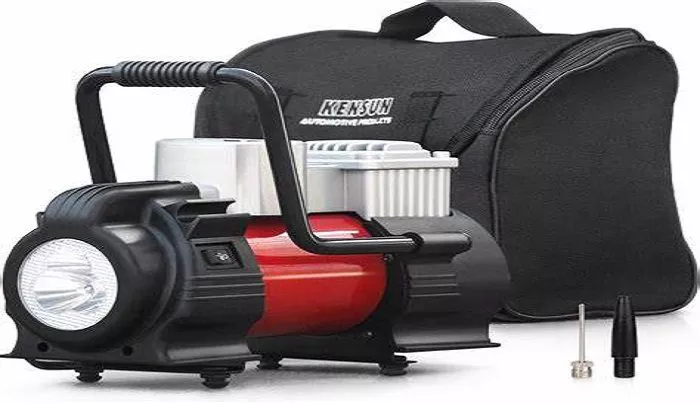Air compressors are essential tools in automotive repair, construction, manufacturing, and DIY projects. The Kensun Air Compressor is a reliable and efficient model designed for both professional and home use. However, to maximize its performance and lifespan, proper operation and maintenance are crucial.
Understanding the Kensun Air Compressor
Key Features
Portability: Lightweight and easy to transport.
High Efficiency:Fast inflation with minimal noise.
Durability:Built with robust materials for long-term use.
Versatility:Compatible with tires, sports equipment, inflatables, and more.
Common Models
Kensun offers different models, including
- Portable 12V DC compressors (for cars and small inflatables).
- Heavy-duty compressors (for industrial and workshop use).
General Safety Measures
Read the manual: Understand your model’s specifications and warnings.
Wear protective gear: Safety glasses and gloves are recommended.
Ensure proper ventilation: Avoid using in enclosed spaces to prevent overheating.
Check power sources: Ensure correct voltage (12V for car models, 110V/220V for AC models).
Inspect hoses and connectors: Look for cracks or leaks before use.
Workplace Safety
- Keep the compressor on a stable, flat surface.
- Avoid water exposure to prevent electrical hazards.
- Do not exceed the maximum PSI rating of the compressor.
Step-by-Step Operating Instructions
Attach the Hose & Nozzle
- Screw the hose firmly onto the compressor’s outlet.
- Select the correct nozzle for your application (tire chuck, inflator needle, etc.).
Set the Desired Pressure
- Check the recommended PSI for your application (e.g., car tires typically need 30-35 PSI).
- Use the built-in pressure gauge to monitor levels.
- Set the automatic shut-off (if available) to avoid over-inflation.
Begin Inflation
- Attach the nozzle securely to the tire or inflatable.
- Disconnect once the desired PSI is reached.
Power Down & Store Properly
- Turn off and unplug the compressor.
- Release any remaining air from the hose.
- Coil the hose neatly and store in a dry place.
Maintenance & Troubleshooting
Regular Maintenance Tips
Clean air filters: Clogged filters reduce efficiency.
Check for leaks: Apply soapy water to hoses; bubbles indicate leaks.
Common Issues & Solutions
| Problem | Possible Cause | Solution |
|---|---|---|
| Compressor won’t start | Power supply issue, blown fuse | Check connections, replace fuse |
| Low airflow | Clogged filter, leaking hose | Clean/replace filter, tighten connections |
| Overheating | Continuous use, poor ventilation | Allow cooling breaks, improve airflow |
| Inaccurate pressure reading | Faulty gauge | Calibrate or replace gauge |
Best Practices for Optimal Performance
Avoid continuous long runs: Let the compressor cool periodically.
Use the right accessories: Match nozzles and hoses to the task.
Store properly: MKeep in a dry, dust-free environment.
Follow manufacturer guidelines: Adhere to recommended maintenance schedules.
Conclusion
The Kensun Air Compressor is a powerful and reliable tool when used correctly. By following this guide, users can ensure safe operation, extended lifespan, and peak performance. Always prioritize safety checks, proper maintenance, and correct usage techniques to get the best results.For further assistance, consult the Kensun user manual or contact their customer support. Happy inflating!

